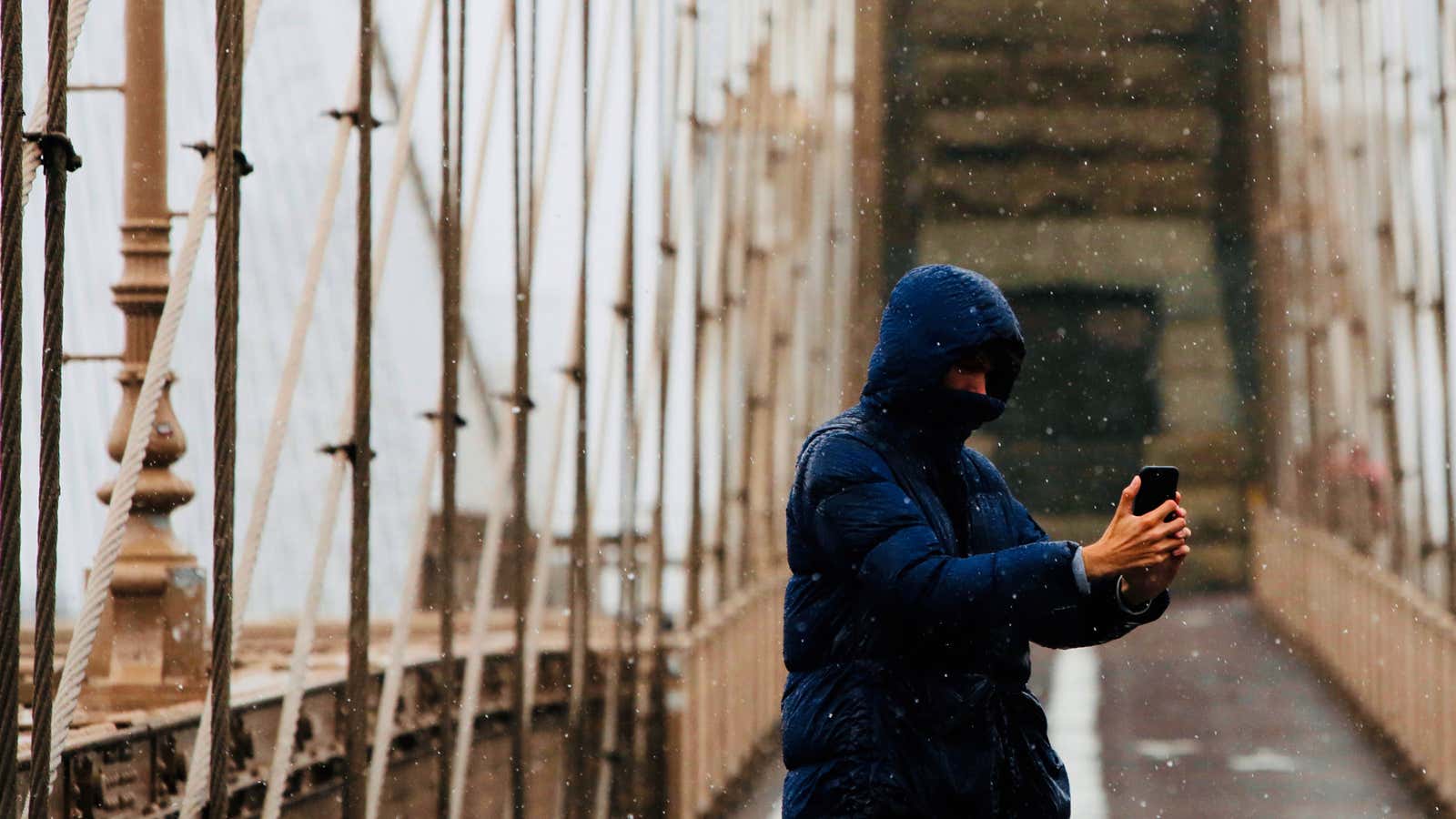

If you’re in the US and concerned about data privacy, you can breathe a little easier today (June 22). The nation’s highest court just ruled that cellphone location data is protected by the Fourth Amendment of the US Constitution.
The ruling in Carpenter v. US (pdf) protects not only digital privacy, but freedom of movement. A divided Supreme Court, split 5-4 with a plethora of dissenting opinions issued, held that “an individual maintains a legitimate expectation of privacy in the record of his physical movements as captured through” cell signal location information (CSLI). That means police need a warrant based on probable cause in order to obtain your records from cellphone companies .
AdvertisementPhone companies collect information about the locations where you’ve traveled for an innocuous reason. The mobile phones of 400 million US cellphone users “ping” cellphone towers as they move around, and companies keep the information for up to five years with the goal of improving wireless networks. The pings don’t reveal anything said in conversation. But they do, taken together, create a map that can be used to track your activities retrospectively in an investigation.
Because the technology is relatively new, it wasn’t clear until now whether the information qualifies for constitutional protections preventing searches and seizures without a warrant based on probable cause. Chief justice John Roberts wrote the majority opinion, presenting the issue as follows, “The question we confront today is how to apply the Fourth Amendment to a new phenomenon: the ability to chronicle a person’s past movements through the record of his cell phone signals … cell phone location information is detailed, encyclopedic, and effortlessly compiled.”
In this case—which arose from a series of cellphone store robberies, ironically—police obtained a court order for 127 days of a suspect named Timothy Carpenter’s location data based on “reasonable grounds,” rather than the more strict “probable cause” standard. The government argued that people have no reasonable expectation of privacy in their location data because they voluntarily submit it to third parties—wireless service providers—and so no warrant is necessary.
The high court disagreed. The opinion states:
AdvertisementGiven the unique nature of cell phone location records, the fact that the information is held by a third party does not by itself overcome the user’s claim to Fourth Amendment protection … we hold that an individual maintains a legitimate expectation of privacy in the record of his physical movements as captured through CSLI. The location information obtained from Carpenter’s wireless carriers was the product of a search.
Indeed, the ruling provides a robust defense of privacy in a time during which the notion has come to seem practically old-fashioned . “A person does not surrender all Fourth Amendment protection by venturing into the public sphere,” Roberts writes. “To the contrary, “what [one] seeks to preserve as private, even in an area accessible to the public, may be constitutionally protected.”
The high court noted that “the retrospective quality” of the data gives police access to information that was previously unknowable, and with just “the click of a button.” Before, attempts to reconstruct movements “were limited by a dearth of records and the frailties of recollection,” the opinion notes. Not so anymore. “With access to CSLI, the Government can now travel back in time to retrace a person’s whereabouts,” Roberts writes. This is problematic not only for a defendant subject to such an intrusion, but for all cellphone users, he argues, writing, “this newfound tracking capacity runs against everyone.”
Still, the opinion warns that the decision is limited and “narrow.” The court doesn’t call into question conventional surveillance techniques and tools, such as security cameras. Nor does the decision affect other business records that might incidentally reveal location information, or collection techniques involving foreign affairs or national security. The ruling also allows for the fact that there may be exceptions to the warrant requirement under “exigent circumstances.”
AdvertisementThe majority is somewhat circumspect, heeding the warning of justices before them who have contended with the constitutional questions raised by new technologies. Roberts explains, “As Justice Frankfurter noted when considering new innovations in airplanes and radios, the Court must tread carefully in such cases, to ensure that we do not ’embarrass the future.’”
But Roberts chides dissenters, particularly justices Kennedy and Alito, for taking positions that would erode the Fourth Amendment protections and for minimizing the dangers of cellphone location data collection. Relying on historical holdings again, the chief justice writes, “As Justice Brandeis explained in his famous dissent, the Court is obligated—as ‘subtler and more far-reaching means of invading privacy have become available to the Government’—to ensure that the ‘progress of science’ does not erode Fourth Amendment protections.”
Notably, the court’s female contingent—Justices Ginsburg, Sotomayor, and Kagan—all joined Roberts in his opinion, as did justice Breyer. Justice Kennedy dissented in an opinion joined by justices Thomas and Alito, who each also wrote individual dissents, with Thomas joining Alito’s opinion. The court’s most junior justice, Neil Gorsuch, stood alone, writing an independent dissent and joining no other opinions.
Our free, fast, and fun briefing on the global economy, delivered every weekday morning.